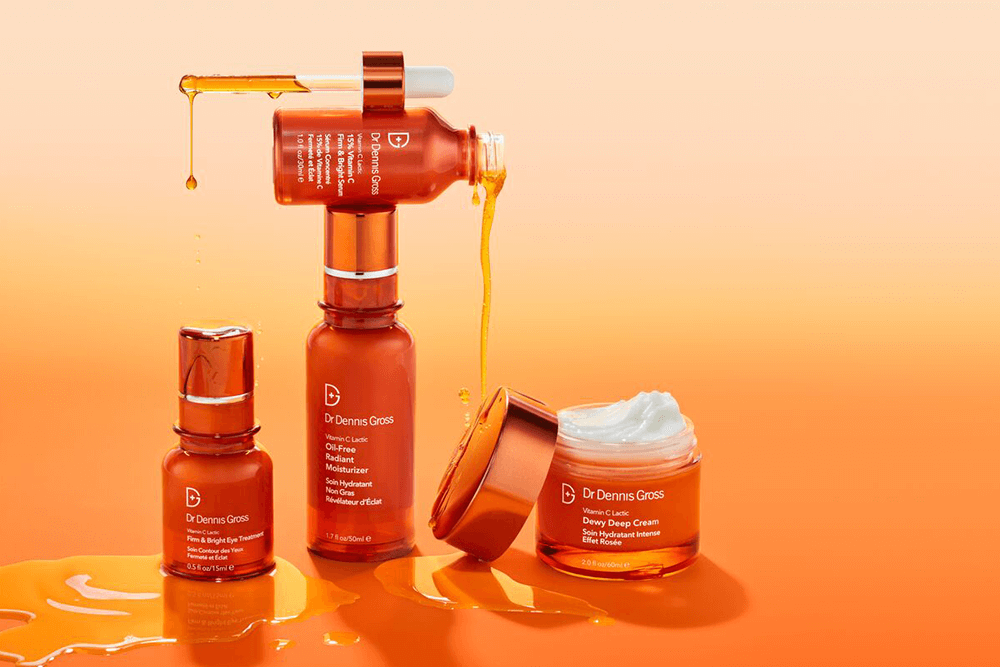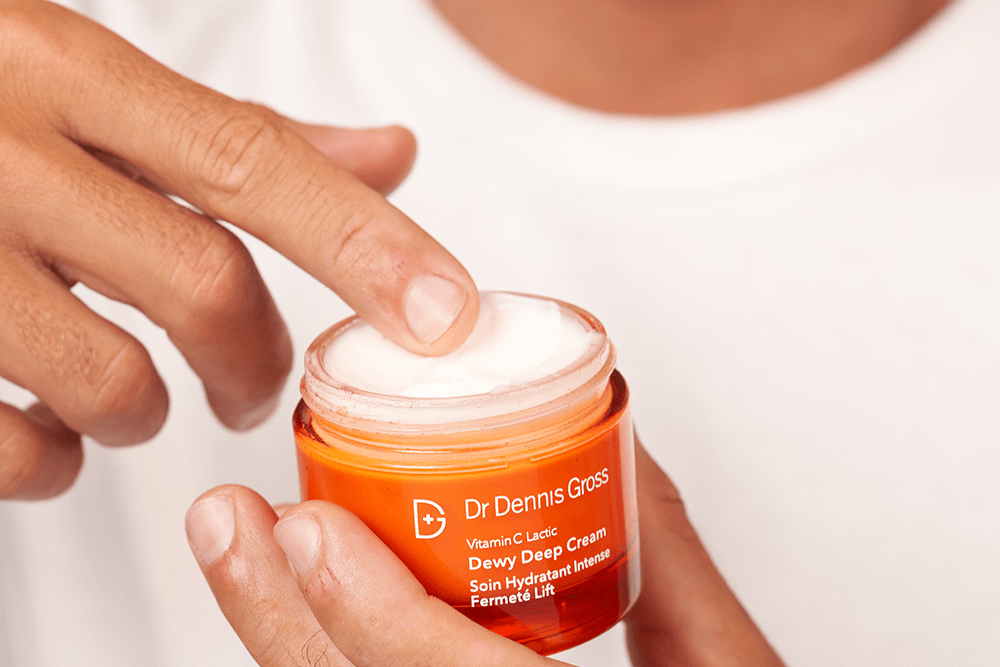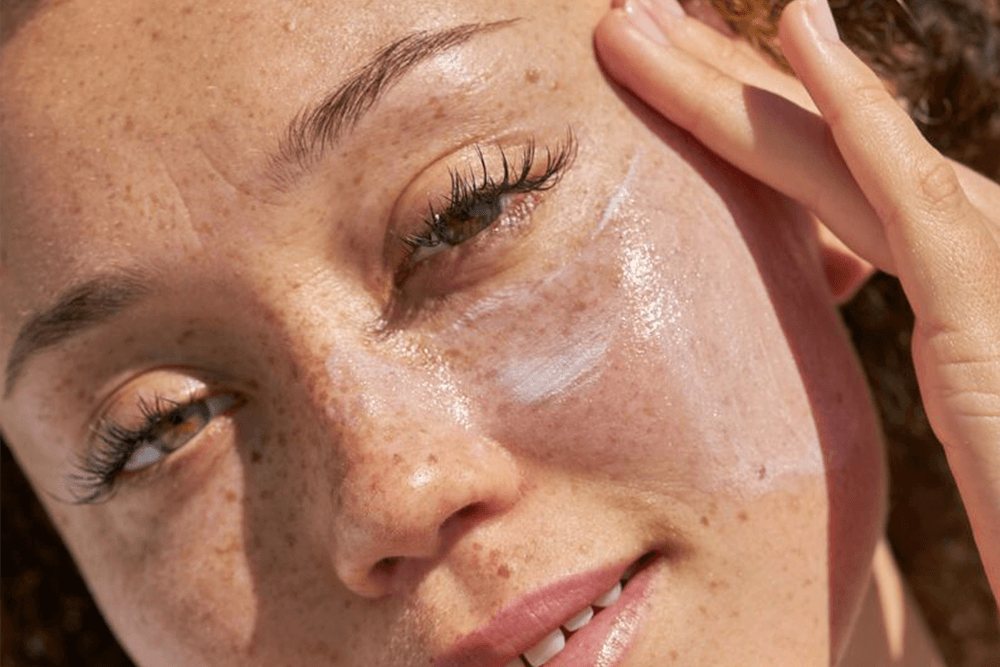The+Source
There’s a reason pictures of a wholesome breakfast always include a glass of freshly squeezed OJ or the fruit itself. Oranges are loaded with vitamin C, and vitamin C plays a key role in maintaining healthy bodily function. How key? Without this vital nutrient, the body can’t make collagen, muscle, or blood vessels. Vitamin C is also an antioxidant, which provides a whole host of other benefits.
While your morning dose of citrus is fantastic for your insides, if you want to harness vitamin C’s powers to impact your exterior, you need to apply it topically. (This is the most direct and efficient route to your face.) Humans can’t produce vitamin C; it’s only available from outside sources, like the food you eat and the skincare you select. Therefore, the products that comprise your morning and evening routines are your only chance to get meaningful amounts of vitamin C into your skin.
No pressure, but skipping C is a giant missed opportunity — not only to maintain your skin’s firmness and even tone, but to improve its resilience, bounce, brightness, and overall health.
Benefits of vitamin C for skin
We all know that collagen (and lots of it) is what keeps skin looking smooth, firm, and lifted. Vitamin C both helps your body produce fresh, new collagen, as well as prevent current collagen from breaking down. Consistent use of vitamin C also reduces hyperpigmentation (yay!) and transepidermal water loss (double yay!).
Vitamin C produces and retains collagen
Vitamin C impacts the amount of collagen in your skin in two ways. The first is by assisting the body in making more of the skin-supporting tissue. Vitamin C catalyzes the enzymes that stabilize collagen molecules and also stimulates overall collagen synthesis. The second manner in which vitamin C directly effects your collagen levels is by helping slow the breakdown of existing collagen. Our world is full of free radicals, rogue oxygen molecules that essentially attack and degrade cells. Antioxidants — especially vitamin C, which is the daddy mac — are kryptonite to free radicals, neutralizing their negative influence. This means that the collagen you already have will last longer.
Vitamin C brightens skin and undereyes
Vitamin C is no one-trick pony. For many ingredients, one great ability (like having a positive effect on collagen levels) would be enough. But vitamin C doesn’t stop there. It can help decrease excess pigmentation by inhibiting tyrosinase (an enzyme in melanocytes that triggers melanin production). Continued, daily use of a vitamin C product can help even skin’s tone, minimize dark spots and hyperpigmentation (including acne scars), and reduce the appearance of undereye circles. The overall effect is a brighter, more luminous complexion.
Vitamin C hydrates skin
Vitamin C’s significance related to skin’s moisture levels doesn’t get as much airtime as its other major skin benefits. But this advantage shouldn’t be overlooked. Vitamin C has been proven to increase skin’s barrier function. The skin barrier is what keeps the bad stuff (think dirt, germs, and other irritants) out and the good things (moisture is the main one, but really, you don’t want anything leaking out of your body) in. Scientists are able to measure the strength of the skin barrier by tracking skin’s transepidermal water loss (TEWL). This is the amount of moisture that evaporates from skin. The higher the number, the more water that’s seeping out and the drier your skin will become. Using vitamin C on a regular basis ups the barrier’s resilience and helps keep skin hydrated and healthy. Couple vitamin C with another barrier booster like lactic acid, proven to stimulate both ceramide and glycosaminoglycan (GAG) production, and you get a dynamic duo that improves skin barrier function overall.
How to use vitamin C for skincare
There are few products in your skincare routine that can’t benefit from the addition of vitamin C to their ingredient formulation. Caveat: Not all vitamin C is created equal. In fact, vitamin C is a notoriously unstable ingredient, so any old form of it won’t work effectively. Two versions that have been proven to maintain their potency in skincare formulations are 3-O ethyl ascorbic acid and ascorbic acid. Look for one or the other (or both!) on your product label.
If you’re new to incorporating vitamin C into your daily regimen, here are three places to start:
Vitamin C Serum: This product type generally contains the most potent, concentrated form of actives. If you want to get the most bang for your buck, always select a serum. It will give you the fastest return on your investment by saturating skin with high levels of the good stuff. Dr. Dennis Gross Vitamin C Lactic 15% Vitamin C Firm & Bright Serum is packed with a bananas amount of vitamin C, plus other skin tone-eveners, like licorice root and mulberry extract.
Vitamin C Moisturizer: Every skin type needs hydration (yes, even oily and acne-prone). It keeps skin supple and strong, enabling it to bounce back from stressors. Incorporating vitamin C here gives your face an extra dose of the superstar ingredient. For complexions that trend toward parched, there’s Dr. Dennis Gross Vitamin C Lactic Dewy Deep Cream, which includes vitamin C and lactic acid, an alpha-hydroxy acid shown to reduce TEWL and increase the penetration of other skincare ingredients. If you’re worried your skin will break out, try Dr. Dennis Gross Vitamin C Lactic Oil-Free Radiant Moisturizer. It also contains vitamin C and lactic acid, but in a non-comedogenic formulation.
Vitamin C Eye Cream: The right treatment can help remedy eye-area concerns from puffiness and dark circles to crepiness and fine lines. With its ability to build collagen and brighten skin, vitamin C is an obvious must-have ingredient in items designated for this delicate skin. Dr. Dennis Gross Vitamin C Lactic Firm & Bright Eye Treatment generates next-level improvements in as little as one week.
When should I apply vitamin C on my face?
Any vitamin C product should come after you’ve cleansed and exfoliated your face. (You don’t want to remove the potent ingredient you’ve just smoothed on, after all.) There’s no rule that states you can only use vitamin C once a day. Some people like to load up on their topical C, reaching for it day and night. However, if you had to select a single time for your vitamin C moment, make it the morning since vitamin C under your SPF makes the sunscreen even more effective.
Potential side effects and risks of vitamin C
As a whole, topical vitamin C is generally well-tolerated by all skin types and tones. It’s also safe to use while pregnant or breast-feeding. However, high levels of vitamin C in skincare can sometimes trigger irritation and redness. If your skin tends to be the reactive sort, begin your vitamin C journey with products containing a lower concentration of the antioxidant (like a cream or lotion, for example, as opposed to a serum). Apply every two to three days and gauge how your skin responds. If your complexion remains calm, increase to daily use, and then up your product game completely by incorporating a more potent version of vitamin C in your skincare regimen.








